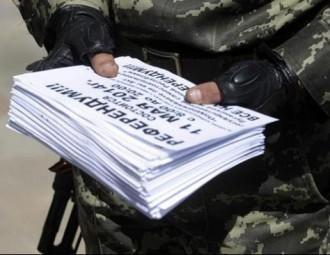Valery Karbalevich: Ukrainian referendums only made the situation even more complicated

The goals of Moscow remain to be the same, but it wants to reach them through different methods: to put Ukraine under close political and economic surveillance.
On May 11 in Lugansk and Donetsk regions the so-called “referendums” on the rights of regions for self-determination took place. Both the referendums were organized by people who receive orders from Moscow and resulted in “elegant victories” with 94-98 per cent of voices in support of independence in Lugansk and 89 per cent of support in Donetsk.
Why were referendums needed if they didn’t change the legal position of the regions? Can the figures drawn at gun point be trusted? How will Kremlin react to the “expression of popular will” in Donetsk and Lugansk?
The political scientist Valery Karbalevich answered the questions of the EuroBelarus Information Service.
- Can the referendums, which were held without observance of any rules and held at gun point, be called legitimate?
- The legitimacy depends on the political stance: it will be recognized as legal by those who benefit from that. From the very beginning it was clear that the Ukrainian government and the west think that the “referendums” were illegitimate, whereas Russia will use them in the information war against both Ukraine and the West.
- But can we trust these figures? A little bit earlier the results of social polls were announced, according to which more than 70 per cent of Ukraine’s citizens stand for the unity and integrity of Ukraine.
- It is hard to believe the announced figures unless they were collected after a thorough observance of all procedures; so this data can hardly be named actual expression of popular will in Donetsk and Lugansk.
- The legal status of the regions isn’t changing: there is no saying that Lugansk and Donetsk regions will join Russia or leave Ukraine. Then what was the sense of these “referendums” at all?
- All the inconsistency of situation in Lugansk and Donetsk regions is concentrated in these “referendums”. And the organizers themselves don’t know what to do with the results after Putin suggested postponing the referendums.
It only proves that the organizers of the “referendums” are not independent, but controlled political players. The uncertainty that we are having today can be applied to anything.
Ukrainian referendums didn’t clarify the situation; they only made it even more complicated.
- You have recalled that earlier Vladimir Putin called upon separatists to postpone the “referendums”. Was it a clumsy attempt to distance from separatists or an attempt to demonstrate that Russia doesn’t control the “referendums”?
- Putin saw the doubtfulness of the situation with the “referendums”, that is why from the very beginning he was trying to dissociate himself. In result, it might seem as though Russia doesn’t control the separatists and doesn’t control the process.
But in reality Moscow wants to reach its original goals, but with the help of different methods. The goal of Kremlin is to make Ukraine a weak state with not very legitimate government, with the independent regions which will understand the language of power. I.e. Russia wants to put Ukraine under close political and economic surveillance.
- Will the “referendums” help to reach this goal?
- At least they won’t be in the way. These “referendums” can be used both in the information war and in the diplomatic negotiations.
- Which actions Ukraine is to expect from Ukraine after the “referendums”?
- The latest statements made by Putin are confusing. Before that it was clear that the main goal of Russia is to disrupt the president election, which gave the right to legally interfere in Ukraine’s domestic affairs because there was no legitimate government.
However, the statement made by Putin demonstrated that Moscow doesn’t’ have a clear strategy and tactics; it is reacting to the changing situation, which makes it hard to forecast Russia’s further actions.
-
03.01
-
07.10
-
22.09
-
17.08
-
12.08
-
30.09








































